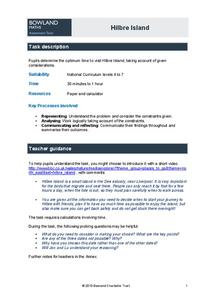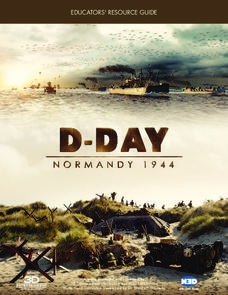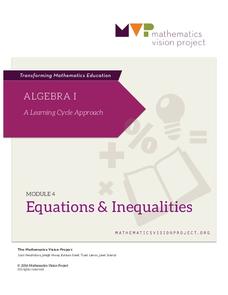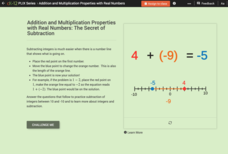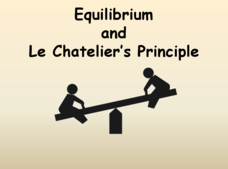Bowland
Hilbre Island
Young travelers plan a trip to Hilbre Island based on constraints on tides and time. They use a timeline to help determine the optimal day/time to make the trip.
D-Day Normandy 1944
D-Day Normandy 1944
No study of World War II would be complete without an in-depth examination of the events of June 6, 1944. Pascal Vuong's D-Day Normandy:1944, is the perfect vehicle to convey the sheer magnitude of the events that have been called...
K5 Learning
The Wolf
Fourth graders have likely heard the expression to cry wolf, but they may not know the saying's origin. A short reading passage tells the story and includes four comprehension questions for pupils to demonstrate their...
Illustrative Mathematics
Party Favors
Pia is putting stickers into party bags. She starts by putting 10 stickers in each bag, and over the course of a week she adds several bundles of ten stickers to each bag, as well as making more bags. Second graders must find the number...
Physics Classroom
Charge Interactions
Has your class been repelled by your previous magnetism lesson plan? Try a fun interactive instead! The activity, part of the Static Electricity series, challenges scholars to infer the charges of a group of magnets based upon their...
CCSS Math Activities
Ferris Wheel
Wheel the resource right into your classroom. Young mathematicians use given dimensions of a Ferris wheel to write a height versus time function. They use their functions to answer a set of questions about the Ferris wheel.
Mathematics Vision Project
Module 4: Equations and Inequalities
Can you justify that mathematically? Help learners see the process of solving as using mathematical properties rather than a set of steps to memorize in the fourth module of a nine-part Algebra I series. The module contains six...
College Board
Calculations Aren't Enough!
Unlike mathematics, statistics comes with a context. The author reminds teachers that data analysis involves using the context to make sense of the numbers. The article stresses good communication skills by highlighting the scoring...
Space Awareness
Fizzy Balloons - C02 in School
Carbon dioxide is a very important gas; it is present in the air, used in cooking, and supports plant and animal life. Scholars investigate the properties of carbon dioxide with three different activities. They experience a color change,...
Scholastic
Presenting Persuasively (Grades 6-8)
Teens and pre-teens are a prime target for advertisers, so how are they doing it? An interactive lesson highlights the strategies used by advertisers, such as visual imagery and verbal clues. Then, a short writing assignment puts those...
EngageNY
Estimating Probabilities by Collecting Data
Take a spin to determine experimental probability. Small groups spin a spinner and keep track of the sums of the spins and calculate the resulting probabilities. Pupils use simulated frequencies to practice finding other probabilities to...
EngageNY
Positive and Negative Numbers on the Number Line—Opposite Direction and Value
Make your own number line ... using a compass. The first installment of a 21-part series has scholars investigate positive and negative integers on a number line by using a compass to construct points that are the same distance from zero...
Chemistry Collective
Virtual Lab: Determining the Solubility Product
No chemistry lab? No problem! Scholars use a virtual lab to determine the solubility product of four different chemicals. They then use the results of their experiments to see if higher solubility product values equal greater solubility.
Amani Project
Harmony Break! Mood Meter Floor Board
The big idea in the fourth lesson from the Amani Project is that people can experience different emotions in precisely the same event. One participant uses their body to express an emotion. Then other participants move to the area of the...
Mathed Up!
Compound Interest and Depreciation
Discover how to find the value of an interest-bearing account. Individuals watch a video to learn how to use exponential functions to model compound interest. After the video, they complete a worksheet of problems on compound interest.
CK-12 Foundation
Percent of a Number: Rock Climbing
What percent of the 100 ft. rock has Marta climbed? Young mathematicians find the percent of number (the rock height) by moving the climber up and down the rock.
NOAA
Through Robot Eyes
How do robots assist ocean explorers in collecting data and images? The final installment in a five-part series has science scholars examine underwater images collected by robots and identify the organisms shown. Groups then calculate...
Joel Michel Studies
The Tale of Despereaux: Novel Study
What kind of mouse is Despereaux Tilling ... a field mouse? A white-footed mouse? With the novel study for The Tale of Despereaux by Kate DiCamillo, scholars research the different species of mice and draw pictures of the one that they...
CK-12 Foundation
Addition and Multiplication Properties with Real Numbers: The Secret of Subtraction
An interactive boosts mathematicians' knowledge of subtracting integers using a horizontal number line by way of multiple-choice, true or false, and discussion questions.
Science Geek
Equilibrium and Le Chatelier's Principle
Time to shake up the status quo with a presentation that describes Le Chatlier's Principle and has pupils examine situations in which equilibrium is upset. Four examples show different stresses to the reaction and the resulting shift.
Collège Saint Charles Garnier
Coordinating Conjunctions (FANBOYS)
For, and, nor... Spend some time getting coordinating conjunctions just right with your class. Included here are three exercises to practice using these seven connecting words correctly; each worksheet includes a fun image and plenty of...
Scholastic
Spring Is Sprung: Water Movement in Plants
Young scientists use food coloring and celery stalks to determine how water travels through plants.
EngageNY
Measuring Variability for Symmetrical Distributions
How do we measure the deviation of data points from the mean? An enriching activity walks your class through the steps to calculate the standard deviation. Guiding questions connect the steps to the context, so the process...
Curated OER
Parts of a Friendly Letter
The art of writing a letter has not been lost to email and texting! Teach kids how to format a friendly letter with a presentation about the parts of a letter, as well as prompting them to write a letter about their favorite holiday.
